![]() 1st Battalion 22nd Infantry
1st Battalion 22nd Infantry ![]()
MEDAL OF HONOR
Macario Garcia
Company B 1st Battalion 22nd Infantry
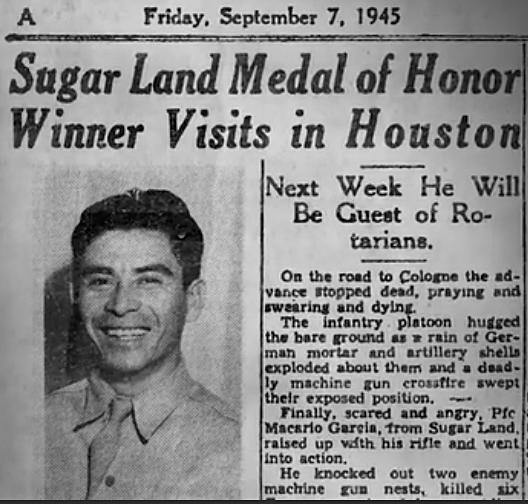
Macario Garcia being treated as a celebrity in the Texas newspapers 1945
From the PBS website
On August 23, 1945 Macario Garcia was presented with the Medal of Honor in Washington. D.C. by President Harry S. Truman.
Garcia returned to his home in Sugarland, Texas, a part of the metropolitan area of Houston in Fort Bend County.
Two weeks later on September 7,
1945 he was the subject of an article and photo in the Houston
Post newspaper
announcing the presentation to him of an award citation by the
Good Neighbor Commission at the Civil Courthouse
in Richmond, the County seat of Fort Bend County and also a part
of the metropolitan area of Houston.
That same day he was also the subject of articles in other newspapers celebrating him as a local and national hero.
Two days later on September 9, 1945 he was given a party and dance in his honor at the City Hall in Richmond, Texas.
One day later on September 10,
1945 Garcia went into the Oasis cafe in Richmond and was refused
service because he was Mexican.
Garcia was wearing his uniform at the time and therefore
presumably also his Medal of Honor ribbon and yet he was denied
service
because of his ethnic background. He argued with the cafe owner
and the argument turned violent with Garcia demolishing much
of the cafe's property and at one time himself being beaten with
a baseball bat.
The police were called to the
scene and Garcia was brought to jail. No charges were filed and
he was told to go home
though the whole time he demanded to know why he was refused
service and never received a satisfactory reply.
Local lawyer John J. Herrera who
had met Garcia at the presentation of the Good Neighbor Award
related the incident to the
popular radio show host Walter Winchell who featured the story on
his weekly broadcast, calling national attention to the
community of Richmond. Winchell's derogatory comments about
Richmond and the community's discriminatory treatment
of a war hero embarrassed local officials and criminal charges of
aggravated assault were filed against Garcia for the incident
of September 10.
As the case gained more public
attention more resources were aligned to help Garcia. Hererra
became Garcia's lawyer and donations
for Garcia's defense poured in from across the State. A prominent
lawyer from San Antonio joined Garcia's defense team and
civil authorities made several postponements of the trial.
Garcia's defense lawyer of
record then became James Allred, a former Governor of Texas and
former Federal Judge who was
soon to be re-appointed to a Federal Judiciary position and who
was asked by President Truman to take a hand in Garica's defense.
Richmond County authorities
postponed the trial again and eventually quietly dropped the
charges against Garcia with no publicity
or fanfare.
Macario Garcia thus became an
early pioneer in Civil Rights in 1945 and his case pre-dated the
later and more popularly
thought of beginnings of Civil Rights of the 1950's.
Though he did not set about to
become a champion of Civil Rights on September 10, 1945 at the
Oasis cafe, Macario Garcia
faced events as they unfolded that night with the same
determination and resolute strength that he faced events on the
battlefield
in Europe. Both in combat and back home in society Garcia remains
as a true hero and example of what an American should be.
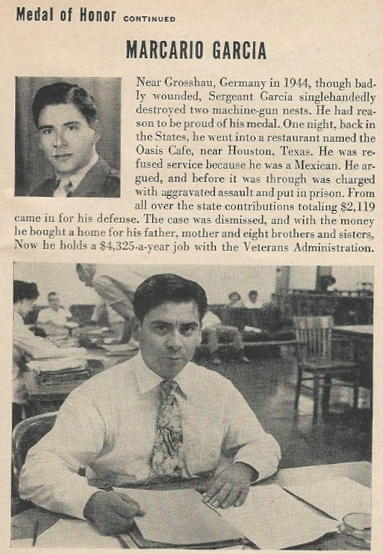
Macario Garcia's first name is misspelled in the above article
From the LULAC Council 60 website
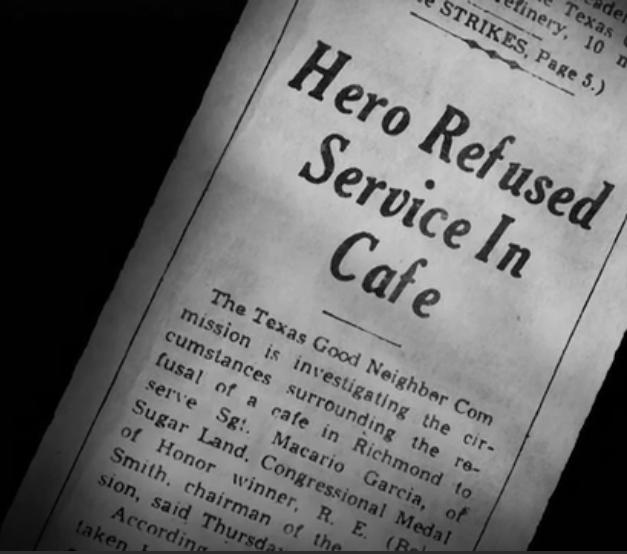
Garcia's case made headlines
From the PBS website
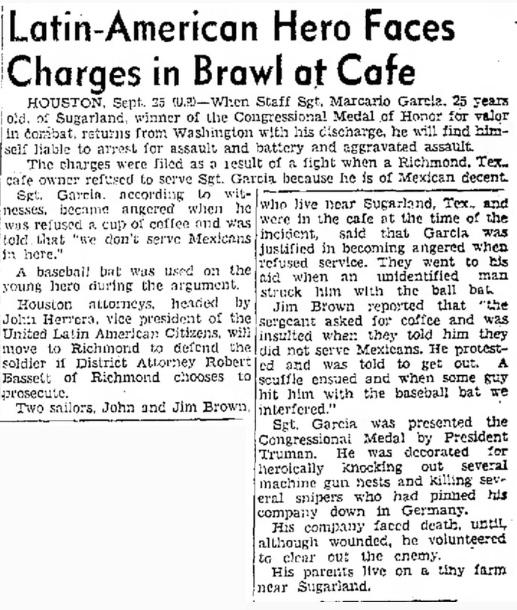
From the LULAC Council 60 website
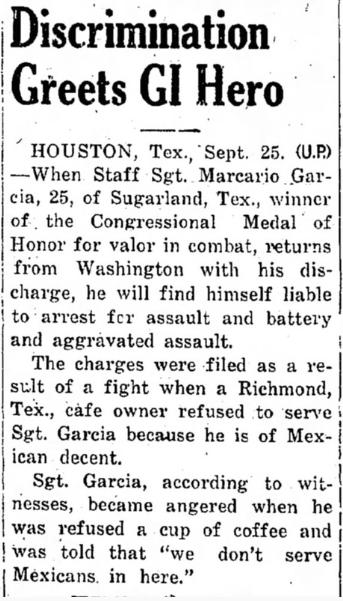
From the LULAC Council 60 website
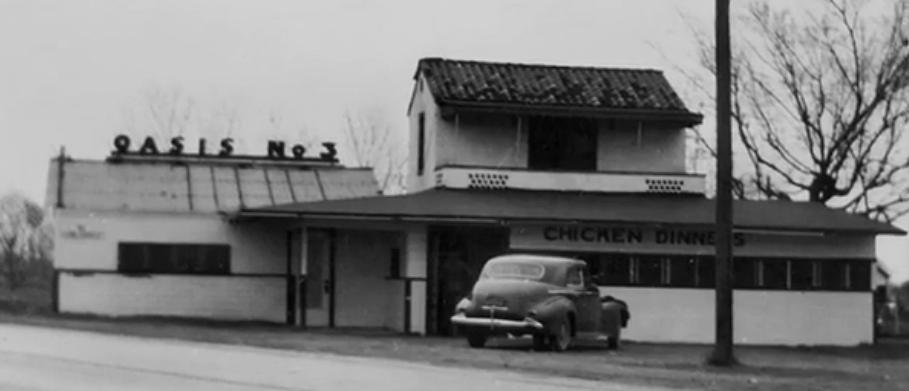
The Oasis cafe in Richmond, Texas where Macario Garcia was refused service
From the PBS website
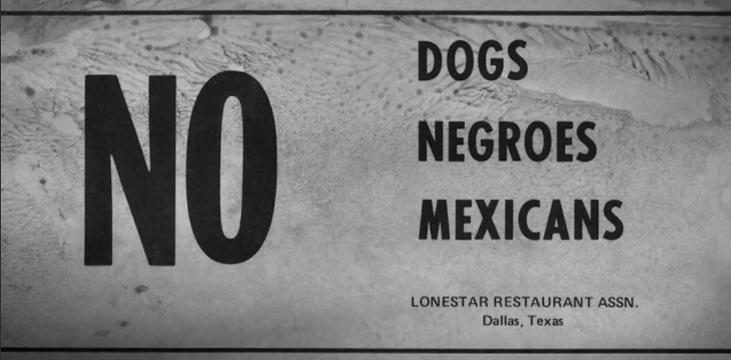
Sign inside a Texas restaurant
From the PBS website
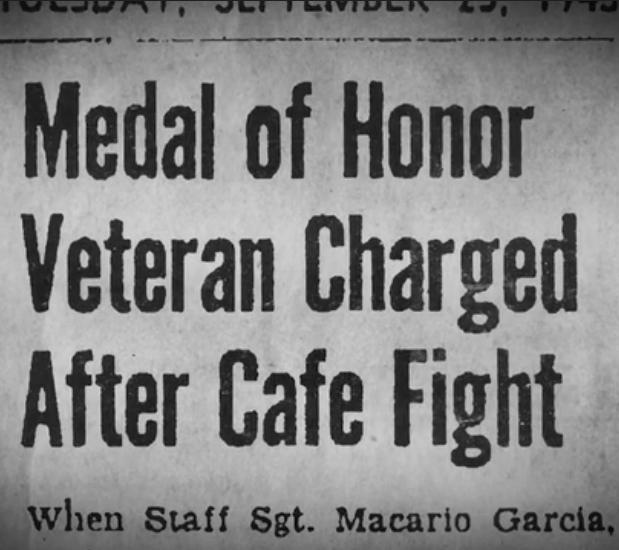
From the PBS website
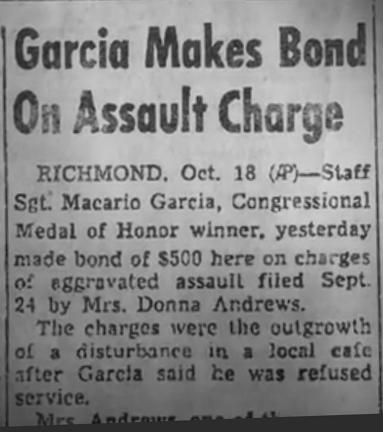
From the PBS website
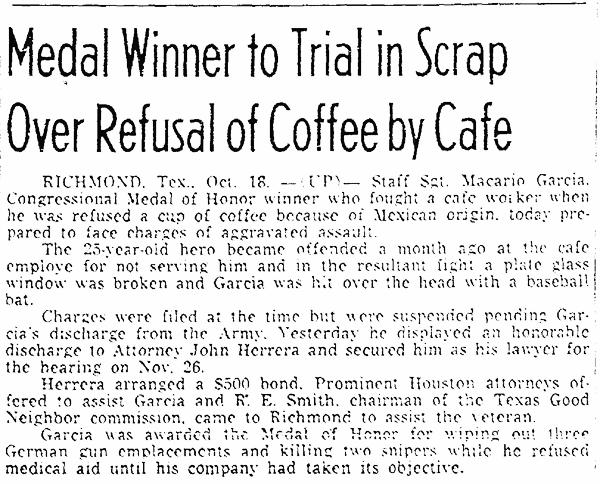
Article from The Abilene Reporter-News Thursday October 18, 1945
Russell Contreras an Associated
Press reporter and photographer gives a poignant recounting of
Macario Garcia's place
in the history of Civil Rights with the following passage:
In a White House
ceremony on August 23, 1945, President Harry Truman presented
Macario, a Mexican immigrant,
with the Medal of Honor. He was the first Mexican immigrant to
receive the Medal of Honor. He also received the Purple Heart
Medal, Bronze Star Medal and Combat Infantryman’s Badge.
When he returned to Houston a couple of weeks later, he was met
with a hero’s welcome. The League of United Latin American
Citizens –
then the largest Latino civil rights organization –
sponsored a special dance in his honor and Mexican American civil
rights leaders retold
the story of his bravery on radio and in speeches.
But despite that celebration, the decorated soldier soon
discovered that the situation in Texas had changed little. A day
after the dance
in his honor, Macario was refused service at the Oasis Cafe in
Richmond, Texas, despite being awarded the Congressional Medal of
Honor less than a month before. According to restaurant owner
Donna Andrews, she refused him service "because he had been
drinking.“
But Macario would tell others he was refused service because he
was "Mexican.” Macario would refuse to leave and,
following a heated
argument, he broke dishes and other cafe equipment. He also
slapped Andrews after she allegedly made racial slurs.
“He disabled the place,” said Ernest Eguia, a fellow
WWII Army veteran and friend.
Macario Garcia was soon facing aggravated assault charges.
The case drew the attention of Houston civil rights attorney John
J. Herrera who started publicizing the event as an example of the
discrimination Mexican Americans still faced in 1945, veterans or
not. A "Garcia Committee" was formed to raise funds for
his defense
as Mexican Americans throughout Texas, poor and middle-class,
began sending in money. Even sympathetic whites started lending
support.
Former Texas attorney general and former governor James Allred
agreed to represent Macario for an upcoming trial in Fort Bend
County.
The publicity around the case, now drawing national attention,
was too much for Fort Bend County officials and the charges were
dropped.
But the community was galvanized. LULAC Council 60, the council
of growing Houston, reported a spike in membership. Congressional
hearings were called to investigate how other Mexican American
returning veterans were being denied services and experiencing
discrimination
despite putting their lives on the line. A movement had begun.
From the Russell Contreras tumblr page
To view a detailed 15 page
article published in the Indiana Law Journal about the historical
and legal aspects of the incident
involving Macario Garcia at the Oasis cafe click on the link
below.
The link is to a PDF file. To return to this page click the "back" arrow in the PDF file.
Home | Photos | Battles & History | Current |
Rosters & Reports | Medal of Honor | Killed in Action |
Personnel Locator | Commanders | Station List | Campaigns |
Honors | Insignia & Memorabilia | 4-42 Artillery | Taps |
What's New | Editorial | Links |